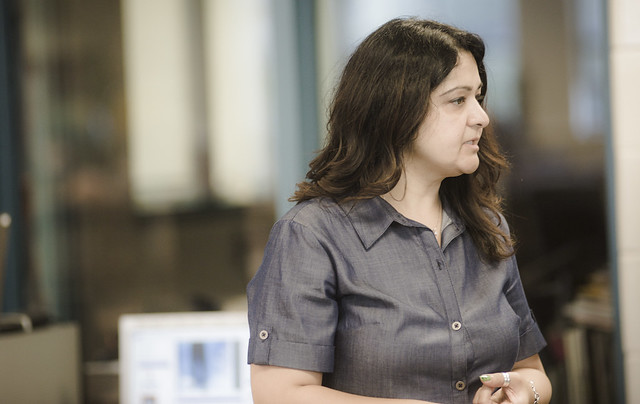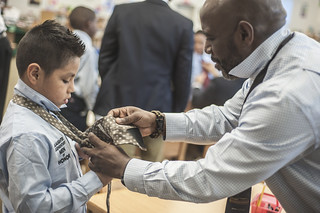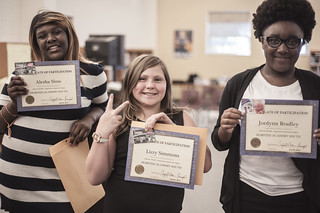Leaning into Equity with a Deeper Learning Shift: From Power and Control to Empowerment and Values
Written by Justin Elliot
Power and Control
In the Deeper Learning Department, we are pushing for equitable educational experiences by supporting teachers in a paradigm shift: from controlling our classrooms through power; to empowering, engaging, and embracing our classrooms with values.
There are three main sources of power that attempt to control teaching and learning in classrooms: The power of governments to control what is taught and when it is taught, the power of testing corporations to control how it is taught and how it is measured, and power of the teachers to coerce, manipulate, and extrinsically reward students for compliance and “achievement”.
When our classrooms are focused on control through power, there is little space for the authentic engagement of the students or teachers. Power and control require compliance. While students or schools from in-power communities may be successful at playing this power game, students and schools in out-of-power communities live it differently… the choice students are forced to perceive is: submit to the control or fight against it. Go through the motions, rebel, or drop out.
As equity-minded teachers, we know that putting kids in this position is unethical. It amounts to educational malpractice.
Deeper learning teachers bring a combination of old and new method in a truer pedagogical paradigm to the students, one that resists the marginalization of students already in the margins of social, economic, and political power. We bring something as deep, real, and authentic as the kids are because they don’t have the patience for the false and fake.
We bring ourselves in a way that moves kids, speaks to them, and shows them how to speak to and for themselves. We meet and embrace them where they are. We flip the power-game script, because kids smell fake better than we do, and they thirst for the real and the true.
So when we flip the power-game upside down, what do we find? Everyone from Ralph Ellison to Alphie Kohn has been telling us for years, and when we listen, we move beneath the surface of power-based control into the values that lead to learner empowerment.
Empowerment and Values
Deeper learning teachers engage and empower our classrooms by:
● Valuing student strengths; relationships, culture, communities.
● Valuing student inquiry; curiosity, initiative, passion, and instinct.
● Valuing students as producers of purposeful work, and not just consumers of learning.
● Valuing student voice by including students as equal contributors in the conversations and the co-constructions of these values.
When we engage our classrooms through values, students value themselves and each other. Classrooms are less dependent on power or control to force their choices. They rely on the values they have established together, developing their own agency and self-control.
This equips students to create themselves into people who work for more equitable outcomes, in two ways. First, by developing their capacities for critical thinking and compassionate communication, thus equipping them to be citizens who see and speak to systemic and institutional racism; who speak truth to power.
Secondly, a values-based approach awakens students to their own agency and empowerment, equipping them to shun victimization. They can then make the personal choices that create the lives they imagine for themselves; the lives that we know they are capable of achieving.
This is not always a straightforward task. It’s as complex as real life. But we are teachers! We are creative, we have the communication skills to relate and to be relatable, and we have the caring to see this through. The work of the Deeper Learning Department is about this shift to valuing the development of people: teachers, students, and the relationships between them; through the equitable growth of all their many capacities.
The Project
Deeper learning is broad term for a variety of pedagogical attitudes focused on valuing and developing all learners, students and teachers, towards…
● Strengths-based approaches; recognizing as assets the relationships, culture, communities, the people that our students bring to the classroom.
● Learner-centered, learner-driven experiences; leveraging intrinsic curiosity, initiative, instinct, to motivate and drive inquiry, passion, and the making sense and meaning of the world.
● Authentic products for real audiences, because when students are producers of purposeful work and not just consumers, there is a reason behind what we do.
● Valuing student voice by including students in the co-constructions, the choices, and the creation of their classrooms…
There are many methods and approaches for creating values-oriented classrooms: Cross-Cultural Competence, Project-Based Learning, Social-Emotional Learning, Passion Projects, CARE for Kids, Different Ways of Knowing, Inquiry-Based instruction, and the newest iteration of these values, Professor Marcus Haynes and Dr. Chris Emdin’s concept Ratchedemics.
They are all deep, and they are all real. They are all about valuing all students’ strengths, voices, and cultures. At its heart, deeper learning is about doing school with kids, and not to kids. It’s about flipping the script from power and control to empowerment by values.
Only then will the next generation of our people be the citizens who can continue the great democratic tradition of speaking truth to power. Only then will the people be able to recreate for all of us the large, complex institutions that, as Dr. Robin DiAngelo truly observes, “that whites built and dominate... often at the expense of and on the uncompensated labor of other groups”.
It is about us, teachers and students, developing each other’s capacity to make, and remake, these social, economic, and political institutions. It is the ultimate cooperative group work. The world is The Project. The Deeper Learning Department is about valuing and developing our people for this work, because it’s our world that we make.


























0 Comments: